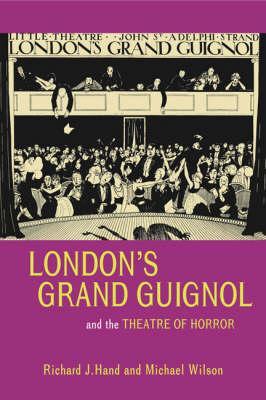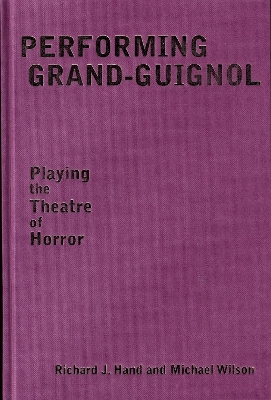Exeter Performance Studies
3 total works
The Theatre du Grand-Guignol in Paris (1897 - 1962) achieved a legendary reputation as the 'Theatre of Horror' a venue displaying such explicit violence and blood-curdling terror that a resident doctor was employed to treat the numerous spectators who fainted each night. Indeed, the phrase 'grand guignol' has entered the language to describe any display of sensational horror.
Since the theatre closed its doors forty years ago, the genre has been overlooked by critics and theatre historians. This book reconsiders the importance and influence of the Grand-Guignol within its social, cultural and historical contexts, and is the first attempt at a major evaluation of the genre as performance. It gives full consideration to practical applications and to the challenges presented to the actor and director.
The book also includes outstanding new translations by the authors of ten Grand-Guignol plays, none of which have been previously available in English. The presentation of these plays in English for the first time is an implicit demand for a total reappraisal of the grand-guignol genre, not least for the unexpected inclusion of two very funny comedies.
London’s Grand Guignol and the Theatre of Horror
by Richard J Hand and Michael Wilson
A companion to UEP’s Grand-Guignol: The French Theatre of Horror (now in its third reprint). A genre that has left more of a mark on British and American culture than we may imagine” (Gothic Studies).
London’s Grand Guignol was established in the early 1920s at the Little Theatre in the West End. It was a high-profile venture that enjoyed popular success as much as critical controversy. On its side were some of the finest actors on the English stage, in the shape of Sybil Thorndike and Lewis Casson, and a team of extremely able writers, including Noël Coward.
London's Grand Guignol and the Theatre of Horror considers the importance and influence of the English Grand Guignol within its social, cultural and historical contexts. It also presents a selection of ten remakarble English-language Grand Guignol plays, some of which were banned by the Lord Chamberlain, the censor of the day, and have never been published or publicly performed. Among the plays in the book is a previously unpublished work by Noël Coward, The Better Half, first performed at the Little Theatre in 1922.
The reviewer in the journal Gothic Studies wrote, of the authors’ previous book: “having recently taught a module on Grand Guignol with third year drama students, it is also worth noting that this book captured their imaginations in a way that few other set texts seem to manage.”
From the authors of the successful Grand-Guignol and London's Grand Guignol - also published by UEP - this book includes translations of a further eleven plays, adding significantly to the repertoire of Grand-Guignol plays available in the English language. The emphasis in the translation and adaptation of these plays is once again to foreground the performability of the scripts within a modern context - making Performing Grand-Guignol an ideal acting guide.
Hand and Wilson have acquired extremely rare acting copies of plays which have never been published and scripts that were published in the early years of the twentieth century but have not been published since - even in French. Includes plays written by, or adapted from, such notable writers as Octave Mirbeau, Gaston Leroux and St John Ervine as well as examples by Grand-Guignol stalwarts Rene Berton and Andre de Lorde. Also included is the 1920s London translation of Blind Man's Buff written by Charles Hellem and Pol d'Estoc and banned by the Lord Chamberlain.
A brief history of the Parisian theatre is also included, for the benefit of readers who have not read the previous books.


